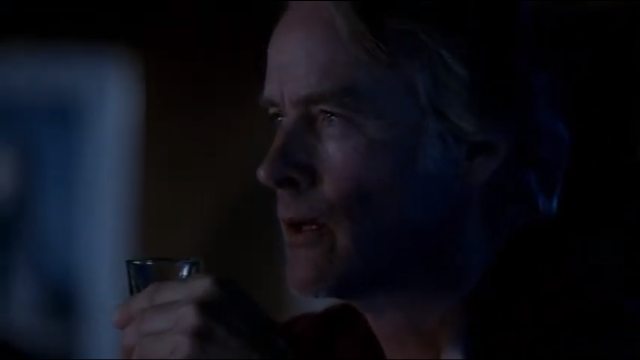Any narrative of any substantial length has characters who exist purely to push the plot forward, and one of the things that makes LOST special is how it often made these characters vivid and memorable without taking the spotlight away from the main characters. Christian Shepard is my all-time favourite example; in a show where identity is perpetually fluid, Christian had a solid self-definition that made him, ironically, extremely flexible in terms of narrative function. He’s a committed fatalist, believing wholeheartedly in both personal and universal destiny – that specific people have specific inherent qualities and that the things that happen to us are how they would always inevitably turn out. What’s especially fun is that he can believe this no matter what happens to him or what situation he’s in – when he’s Chief of Surgery in a top Los Angeles hospital, it’s because he’s has what it takes to be a top surgeon, and when he’s drinking himself to death in Sydney, it’s because he doesn’t have what it takes to apologise to his son. It makes him an interesting comparison to John Locke; John tries so hard to internalise a self-definition and philosophy but he just can’t seem to hold onto it. He would most likely recognise Christian’s archetypal power and sincerity, and might even believe it with his whole heart… right up until the next idea comes along and grabs him with equal fervour. Christian Shepard pulls off what John tries to be. Pull back and look at Christian as a device in a narrative, and he’s a rock sitting in a stream; the whole fun of the flashbacks is seeing the same object imbued with a wildly different archetypal power, like the plucky heroine also being a murderer on the run, or the wise sage being a pathetic failure, but Christian is a device the writers use when they need a spokesman for fatalism, and the other characters can react to him how they see fit.
Equally as interesting but in the opposite way is John’s father (whose real name we never learn, but is most commonly referred to as Anthony Cooper). He is one of the show’s purest villains, a man who not only spreads misery and suffering to everyone he meets but finds that fact highly amusing. He’s not so much a symbol as a walking emotion, inspiring hatred in both John and Sawyer; he conned John out of a kidney, destroyed his relationship with his true love, and crippled him by pushing him out of a window, and he ruined Sawyer’s life by conning his mother and inspiring his father to kill her and himself in a murder-suicide. He’s a walking talking MacGuffin, inspiring both John and Sawyer into action out of revenge and anger; indeed, killing Cooper is Sawyer’s lifelong quest and something that drove him to commit terrible acts that weigh on his soul. He makes it extremely easy to hate him too, having zero compassion or remorse for any of his victims, making it understandable why characters would want to kill him. Unlike Christian, he has no ideological drive and zero interest in debating meaning, except insofar as he can use it to emotionally torture the people around him. He is a villain, through and through, and the writers make him memorable through both the spectacular nature of his crimes and the particular southern-fried manner he speaks in.
What’s great, though, is how at its best, this same effort is put into even minor characters that show up for few or even only one scene. I find myself thinking of the lawyer Michael hires to contest his ex-wife’s custody (played by Saul Rubinek); he exists to lay out the hopelessness of Michael’s cause and make it meaningful when he pursues it anyway, but he sticks in my head because he phrases it delicately but clearly (“It tells me that I’m the best that you can afford.”). This is a man who has done this long enough to both know his own limitations and read the intentions and abilities of his clients, and he is at once a guardian of the threshold Michael is about to cross and a real person with a real history. I think of shows with poor use of minor characters, and I think of something like the Stargate TV franchise, in which these people are empty vessels who exist to be pushed around and lectured by our main characters. There’s something to me in how often the spear carriers of LOST end up lecturing the protagonists; I think of Shannon’s Australian boyfriend mocking Boone, or the cop who deports Sawyer, or the psychic who fails to cure Rose. People serve a clear, specific purpose on the narrative, but they are also real people who had entire lives before we saw them and will continue to live those lives when they pass out of our view. It’s both good storytelling and a mature attitude towards the world, in which people exist outside of our needs of them.


